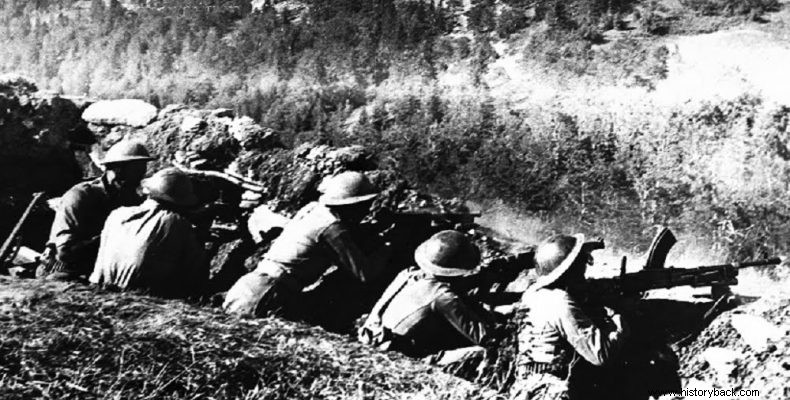
In 1947 the forces of the communist DSE had succeeded, using guerilla warfare tactics, to create problems inversely proportional to their size and power. Taking advantage of the fact that the ES was also in dire straits, while having the burden of guarding all the important populated places in the country, Marco's forces had dominated much of the countryside.
However, political recognition of the rebels was lacking, mainly from the great socialist "mother", the USSR and the neighboring "sister" countries. Zachariadis believed that the much-desired recognition would come if his forces succeeded in capturing an important city, causing an international impact. Thus it was decided to attack the Grevenes.
The battle of Grevena was a consequence of the general political and military situation, as it had been formed in Greece, in the summer of 1947. The guerilla war in the country had been going on for more than a year - officially. However, the KKE still did not officially adopt the rebel forces, speaking of groups of "persecuted democratic citizens".
The surprising thing was not that the KKE operated legally and normally within the framework of parliamentary institutions. His offices throughout the country were open and his newspapers circulated legally.
On June 25, 1947, during the proceedings of the French Communist Party Congress, the delegation of the KKE, consisting of Zachariadis and Porphyrogenis, declared before the European Communists that "all the conditions, political and military and international, were present to create free Greek government".
This move, i.e. the announcement of the formation of a rebel government, convinced the Greek government that the leadership of the KKE was convinced of its victory at the military level and had probably secured the support of the Eastern bloc and maybe-perhaps that of the Stalinist Soviet Union. The government of "free Greece" would probably be declared by August 1947, with all that this entailed on a political and military level.
Essentially, Greece would be cut in two, and the undivided support that the sister regimes would surely provide to Zachariadis could ensure his victory, before American aid arrived. The rebels' position was significantly strengthened by their victory in Pindos, between July 13 and 17, 1947, where they established a stable bridgehead.
Fatefully, all that remained for the leadership of the KKE was to present a spectacular military success, if possible to capture a city, where it could establish the seat of its "free government", properly projecting its success abroad.
Thus, based on Markos' plans, it was decided to attack the Grevenes. The decision had to do with the city's proximity to the new rebel bases in northern Pindos, but also with the limited capabilities of the city's garrison.
At that moment the city was guarded by the 529th Infantry Battalion (TP), under Lt. Col. Konstantinos Pantazis. The battalion had only two companies inside the city, its other company was stationed in the village of Mavranei and two more platoons were guarding the bridge of Eleftherochori.
Lt. Col. Pantazis still had under his command a platoon of armored cars with only two vehicles, an artillery of the 104th Field Artillery Regiment, a 4.2-inch mortar, 100 gendarmes of the Grevena Gendarmerie sub-division and 50 MAU national guards (Rural Security Units).
On the other hand, the rebel forces, still organized in headquarters, extended a total of 11 battalions, with a strength of around 300-350 fighters each. The whole operation was headed by Kikitsas, head of the headquarters of central and western Macedonia, while Giannoulis, head of the headquarters of Voiou-Grammos, assumed responsibility for the attack on the city.
Guerrilla units began to advance towards their designated positions on the night of 23-24 July 1947. At 0330 the attack began, uncoordinated, however, as the guerilla command failed at this point. The guard, too, kept vigil. Lieutenant Colonel Pantazis, the hero of 1940, immediately gave the signal and all the strength of the guard manned their fighting positions, based on the city's defense plan.
Pantazis attempted to contact the Division but the phone line had been cut. But he did not manage to communicate with the superior echelon even by radio, until 05.20, almost two hours after the start of the attack. From the beginning the rebels exerted strong pressure on the garrison.
By 04.20 they had managed to force the gendarmes to retreat, in the area of the church of Ag. Dimitriou. It was their only success. The garrison repulsed all other attacks and reinforced the threatened sector.
Pantazis was not satisfied with his defensive success until then and ordered a counterattack. This counterattack had the flavor of 1940. With the chant of "Air-Air" vibrating the air, the approximately 65 men from two platoons rushed out and within minutes crushed the elite 850th insurgent battalion, which fled, leaving 86 dead on the field. and 46 prisoners.
Then Pantazis also threw the 3/529th Company into the attack, which until then was manning the line of the northern outposts. It was the definitive end for the 850th Battalion, which was literally disbanded. Zachariadis' plans had failed.
